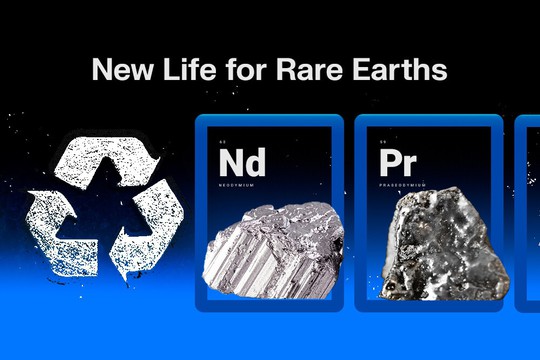China, a major source of REE, recently announced export restrictions on seven of them, potentially limiting the U.S. tech industry’s access to materials such as dysprosium, which is necessary for magnetic storage, motors, and generators.
Western Digital announced that it has created a large-scale hard disk drive recycling program in concert with Microsoft and recycling-industry partners CMR (Critical Materials Recycling) and PedalPoint Recycling. The new process reclaims Rare Earth Oxides (REO) containing dysprosium, neodymium, and praseodymium from hard drives, along with aluminum, steel, gold, palladium, and copper. The REO reclamation takes place completely within the U.S. and those materials go back into the U.S. market.
While most people enjoy PCs that are powered by SSDs, mechanical hard drives are still king in the datacenter. When these drives reach the end of their useful lives, they are usually shredded, and the key materials they’re made of – including several rare earth elements (REE) – end up as e-waste.
The drives came from Microsoft’s U.S. data centers where they were first shredded and then sent to PedalPoint for sorting and processing. Magnets and steel were then sent to CMR, which uses its acid-free dissolution recycling (ADR) technology to extract the rare earth elements.
The reclaimed rare earth elements can then be sold back into the U.S. supply system where they can be used to manufacture new tech products. According to WD’s whitepaper, the reclaiming process produces 95 percent fewer greenhouse gases than virgin mining of the same materials.
If done at a large scale, the reclaimed materials could take the place of some of the materials the U.S. sources from China. However, of the seven materials China is restricting – samarium, gadolinium, terbium, dysprosium, lutetium, scandium, and yttrium – only dysprosium is commonly found in hard drives.
“HDDs are vital to our data center infrastructure, and advancing a circular supply chain is a core focus for Microsoft,” Chuck Graham, Microsoft CVP, Cloud Sourcing, Supply Chain, Sustainability, and Security said in a press release.
"Western Digital is currently expanding the HDD rare earth material capture program based on the successful pilot with Microsoft," Jackie Jung, WD's VP of Global Operations Strategy and Corporate Sustainability told Tom's Hardware. "This program is now in development with a number of our hyperscale customers."
The potential need for hard drive recycling is huge and growing. According to the Financial Times, there were 23,000 data centers with 70 million servers as of 2022. Each of these servers has multiple hard drives which reach their end of life, often after just three to five years. The amount of e-waste overall is expected to reach 75 million tons by 2030.
read more in our Telegram-channel https://t.me/The_International_Affairs

 10:58 29.04.2025 •
10:58 29.04.2025 •























